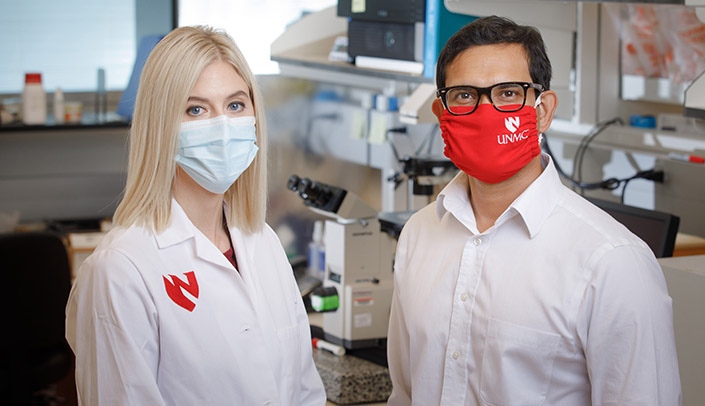The results of the 2020 survey of postdoctoral scholars at UNMC are in and the findings are promising, said Iqbal Ahmad, PhD, a professor in the department of ophthalmology and visual sciences at UNMC.
Notable among the findings:
- Of the scholars surveyed, 86% have presented their research in local, national and international meetings and 47% have a first author publication, an impressive productivity given 37% of those postdocs are in the first year of their training.
- The majority of respondents, 71%, are satisfied with the quality of mentoring at UNMC, while just 4% expressed their dissatisfaction.
- Workshops in grant writing, mentoring, scientific writing and individual career counseling were noted as the top-ranking skills being positively enhanced at UNMC; and
- Seventy-five percent said their mentors met their expectations, of which 22% said their mentor exceeded their expectations.
The survey, which was conducted between March 23 and May 26, was completed by 90 of the 130 scholars (69%) who received it, Dr. Ahmad said.
The survey results reveal how well the scholars are doing and the challenges they face, he said, and can help mentors make adjustments to better meet the needs of their postdocs.
“Our goal is to help our scholars move toward an independent career of their choice in a timely fashion,” Dr. Ahmad said.
“The survey addresses key points in the postdoctoral training and well-being at UNMC,” said Rohit Gaurav, a postdoctoral scholar in the UNMC Department of Internal Medicine and a member of the Postdoctoral Education Advisory Committee. “It may be utilized to formulate strategies for postdocs to pursue an appropriate career path in addition to achieve a work-life balance and job satisfaction.”
Stress and mental health challenges were among the biggest issues the scholars noted, with 42% of respondents indicating this as something that has impacted their productivity.
This is important to note, Dr. Ahmad said, as work-related stress is something mentors can help their scholars address by providing information on how and where to seek counseling and assistance, as well as providing information on well-being seminars that address burnout and a healthy work-life balance. The postdoc education office will be working closely with the mentors on promoting and addressing this.
The majority of postdocs are foreign nationals, making up 63% of the respondents, with the rest being U.S. citizens or permanent residents.
This finding is important, Dr. Ahmad said, because it shows the important role played by the UNMC international office in supporting scholars during the hiring process and any visa- and acclimation-related issues they encounter.
The survey also validates the importance of training in responsible conduct in research offered by the postdoctoral education office, as well as other training workshops in scientific writing, career counseling and grant writing.
“These workshops were ranked high among the scholars as things that would greatly aid in their training and career development,” Dr. Ahmad said.
Mentoring also was noted as one of the most important factors in increasing productivity and decreasing conflicts.
The majority of scholars (70%), surveyed did research on their prospective mentor before accepting their position.
“These informed decisions contribute greatly to the overall satisfaction we see with our scholars at UNMC,” Dr. Ahmad said.
Overall, he said, the survey results were enlightening, showing mentors and leaders the strengths in UNMC postdoctoral training and the areas that are still in need of improvement in the program.
“This survey affirms that while there is always room for improvement, our post-doctoral fellows believe they are being well supported in their training at UNMC,” said Dele Davies, MD, vice chancellor for academic affairs at UNMC. “This is a testament to the excellent advising and training environment from our faculty, excellent wrap-around support by Dr. Iqbal Ahmad, our associate dean for post-doctoral affairs, the Post-Doctoral Council and many other support staff including our international office team.”
